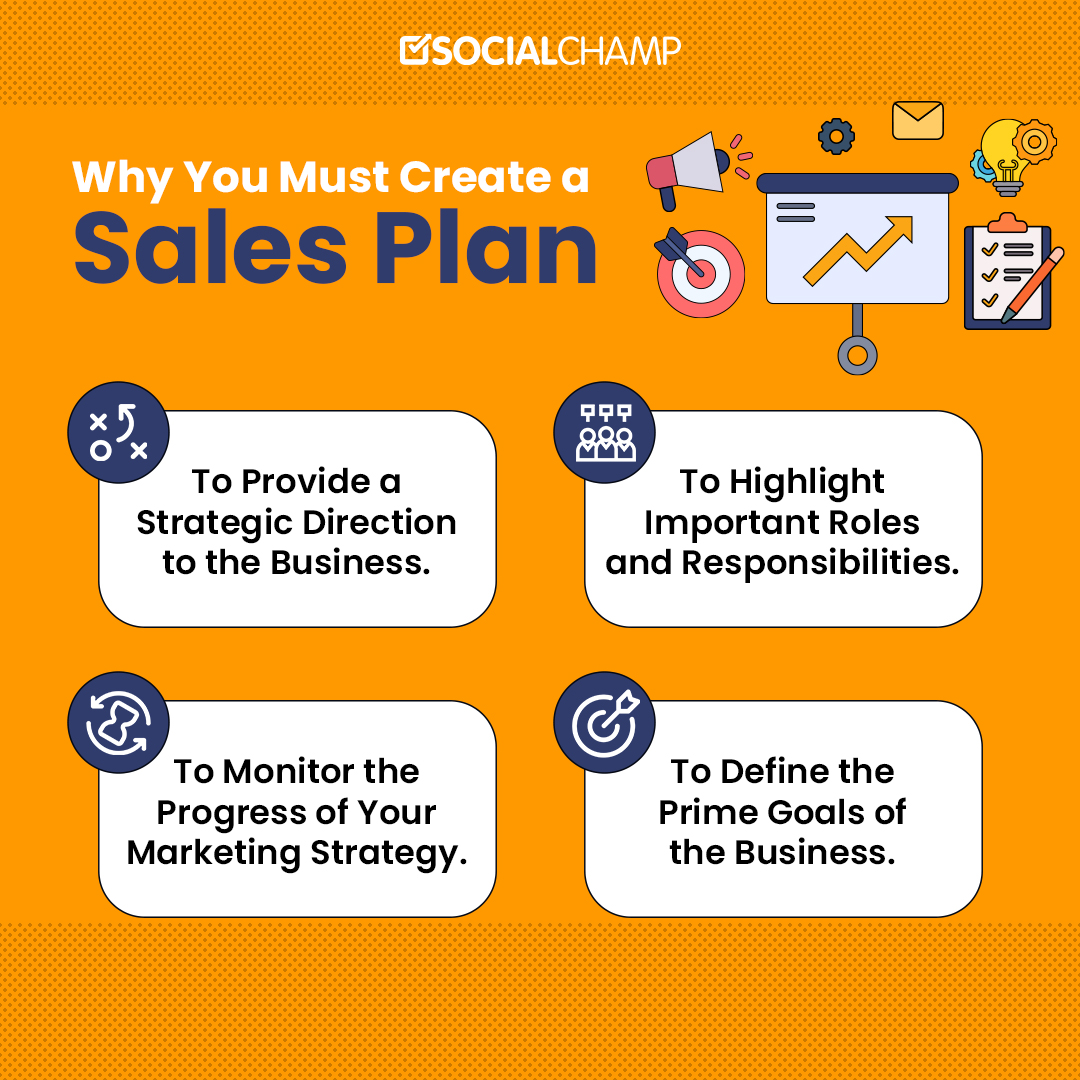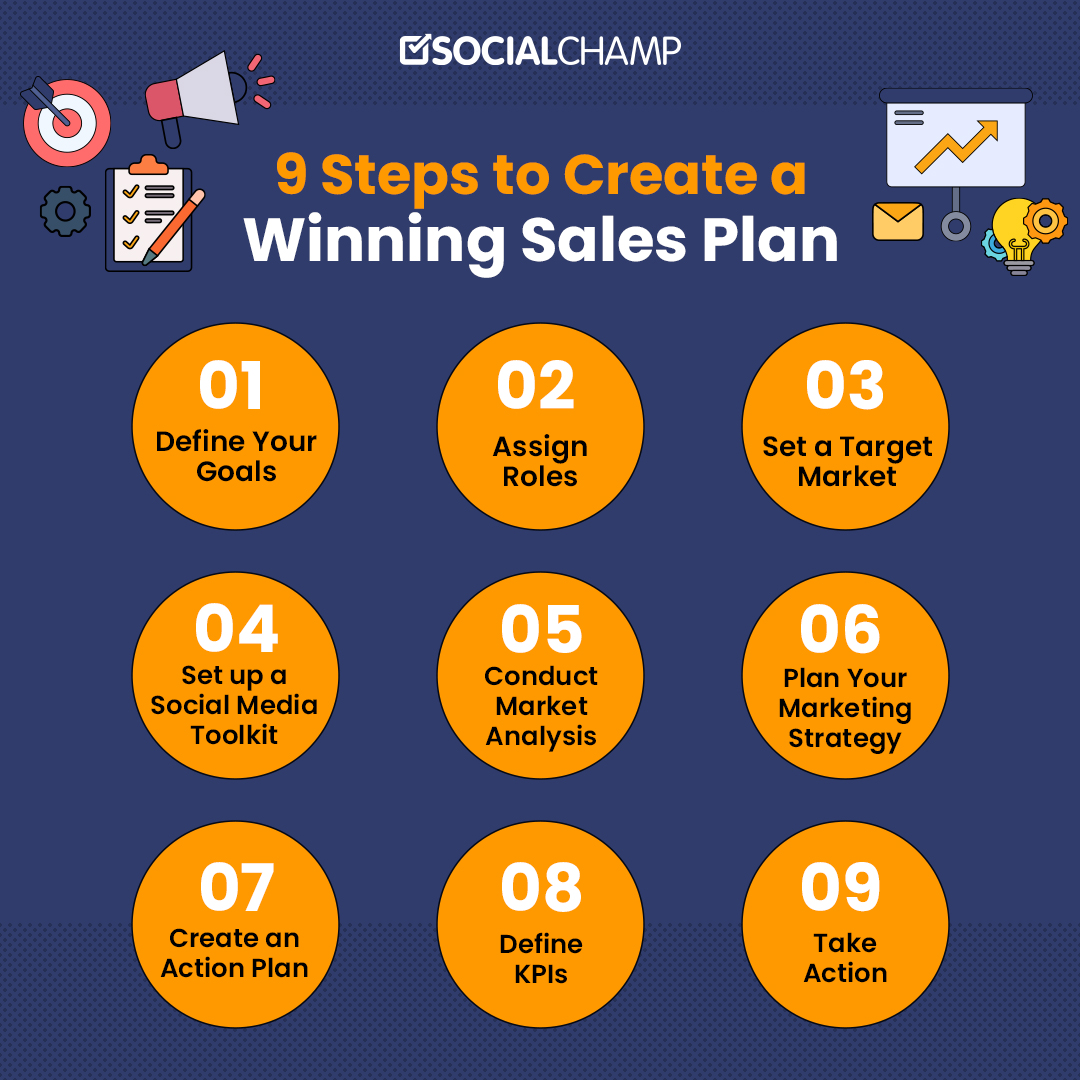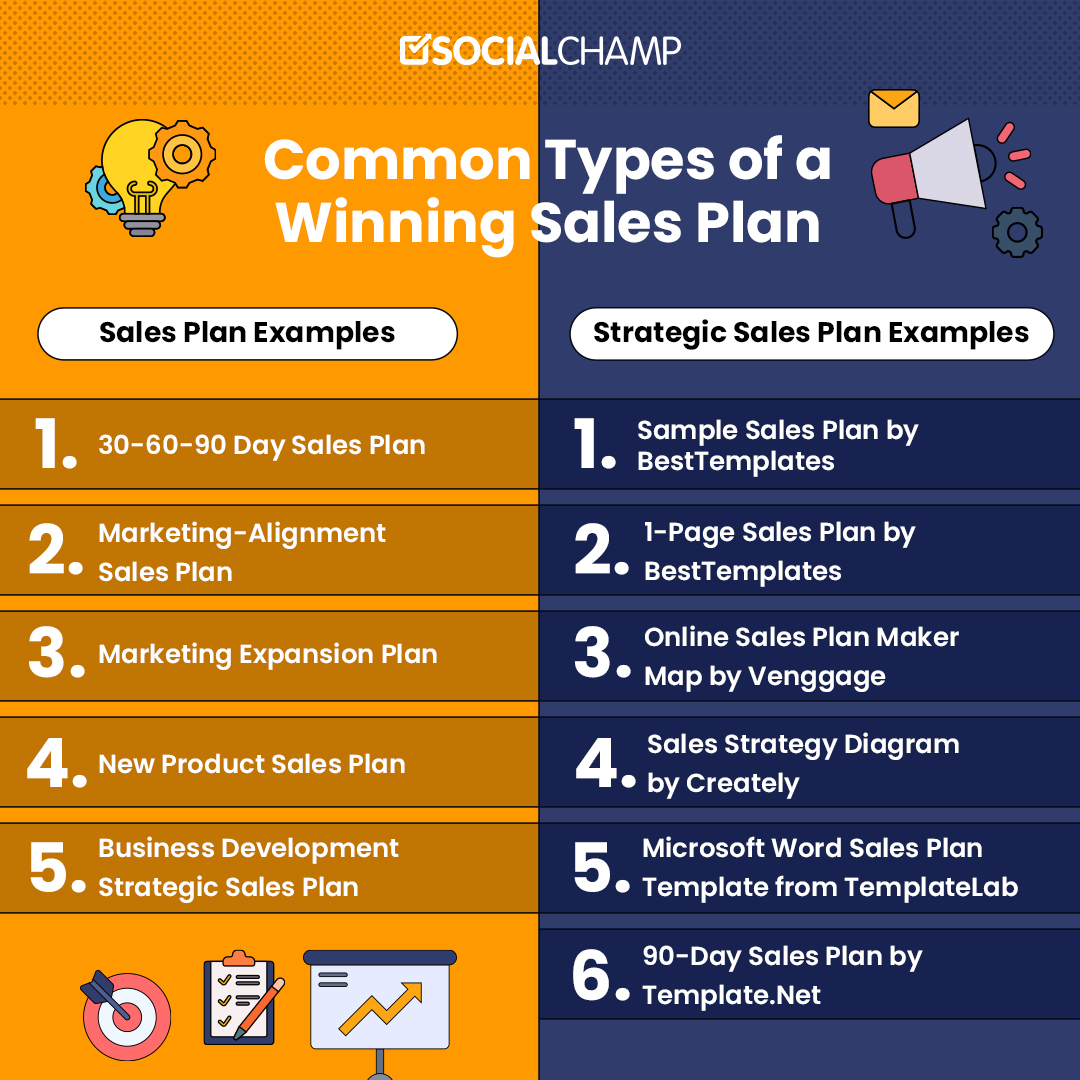Have you ever thought about why your business is still struggling despite multiple attempts and consistent efforts to hit the right targets? Well, that is because your strategies and key implementation parameters are being lost in headless directions, and you are certainly unsure of which techniques must be used and when.
In order to keep the business sales in sync, business managers and marketers usually create a sales plan for their products or services. Whether the need for a good social media management tool or a revamped marketing strategy, the sales plan includes all the major and minor details the business requires to grow profitable.
This comprehensive blog guide discusses how to create a sales plan and win over profitable margins for your business growth. Read ahead to explore more.
What Is a Sales Plan?
A sales plan is a strategic document outlining the specific goals, objectives, target audience, and exclusive tactics any brand will use to achieve its sales targets and shape its customer-deciding journey. It typically includes a detailed analysis of the company’s current sales performance, any previously found loopholes and solutions for improvements, a review of the competitive landscape, and a set of specific sales goals that the company hopes to achieve.
A sales plan also includes key aspects the company must pay good attention to reach its goals. Usually, ways of identifying target markets, developing marketing campaigns, setting sales targets for individual sales representatives, and developing pricing strategies are a common part of an efficient and winning sales plan.
As a business brand or company, you must own a well-crafted sales plan in order to grow and succeed in your target market. With a sales plan, you will get a roadmap for the sales team to follow, ensuring that everyone is working toward the same goals and objectives. Additionally, your company will also be able to measure its progress over time, adjust its strategies as needed, and make informed decisions about future investments in sales and marketing.
Elements of a Sales Plan
Below discussed are the elements that typically go in as an essential part of a credible sales plan.
Executive Summary
A business sales plan includes a high-level overview of all the strategies and requirements, including goals, objectives, key performance indicators, and metrics.
Market Analysis
When creating a sales plan, thoroughly examine the company’s market, including competitors, trends, and opportunities, to learn about the market conditions and where you stand as a brand. Understanding various product strategy frameworks can be a pivotal step in refining the approach to market dynamics and customer preferences.
Sales Objectives
Your sales plan must include the outcomes you want to achieve. You can add measurable targets for the sales team, including revenue goals, customer acquisition targets, and other key performance indicators.
Sales Strategies
The specific tactics and actions play an essential role in leading the business’s marketing strategy to yield profits. This may include prospecting, lead generation, customer outreach, and closing techniques.
Sales Tactics
Once you have set the sales strategies, you need a detailed plan for executing each of them. Hence, this may include a detailed timeline, budget, and resource allocation plan.
Sales Metrics
Identify the key performance indicators you will use to measure your sales plan’s success. It can be anything from social media metrics, impressions, revenue, conversion rates, customer acquisition cost, and customer lifetime value.
Sales Team Structure
The assignment of roles and responsibilities is also integral to the sales plan. You can also include the structure of the sales team, reporting lines, and performance incentives within the sales team structure.
Training and Development
Plans for training and developing the marketing and sales team, including skills development, coaching, and mentoring, can also be added as an important element of the sales plan.
Budget and Resource Allocation
Set the budgeting for sales tools, technology, and personnel. Also, look into the needs of any internal and external sources required by any domain of your business.
Target Audience
Make sure to identify and set the target audience for your sales plan. Each member of your team must be aware of who they are targeting and why.
Why You Must Create a Sales Plan?
Now that you have enough knowledge of what a sales plan is and its elements, you should be convinced to get yours created just now. If that is not the case, then it is quite certain that you still need some winning factors to convince you of why your business needs a sales plan.
It Provides a Strategic Direction
Remember, if you are moving directionless, there are ample chances of you failing to achieve a certain destination.
Similarly, a sales plan helps you to identify your target audience, understand their needs, and outline a strategy to reach and convert them into paying customers. By setting clear goals and outlining the steps needed to achieve them, a sales plan provides a roadmap for your business to follow.
It Highlights Roles and Responsibilities
There are lesser chances of quarrels and misunderstandings within the team as a sales plan clearly outlines your sales team’s and other stakeholders’ responsibilities. It helps you to identify who is responsible for which tasks, how they will be executed, and what resources will be needed. This helps to ensure that everyone is on the same page and working towards the same goals.
It Monitors the Progress of Your Marketing Strategy
You can easily measure the effectiveness of your marketing efforts by choosing the right analytics tracking tools and identifying relevant KPIs. It enables you to track your progress, identify areas of improvement, and make necessary adjustments to your strategy.
It Defines the Prime Goals of the Company
A sales plan helps you define your company’s prime goals and how you will achieve them. It enables you to set realistic sales targets, identify your unique selling proposition, and outline your strategies to achieve your objectives. This is essential for ensuring the long-term success of your business.
9 Steps to Create a Winning Sales Plan
Define Your Goals With a Mission Statement
First of all, start by defining your mission statement and addressing the purpose and goals of your sales plan. This will help you stay focused and ensure that everyone is working towards a common objective.
Assign Roles to Your Team Members
Determine the roles and responsibilities of each team member involved in the sales process. This will help you create teams and ensure that everyone knows what is expected of them so that they can work together effectively.
Set a Target Market
Your brand or service must suffice the needs of a specific set of people. Identify your target market and understand their demographics, needs, preferences, and behaviors. With this technique, you will be able to create a targeted approach to your sales and marketing efforts.
Set Up a Social Media Toolkit
A social media toolkit can help you align all the tools and software you need to reach your target audience through various social media platforms. An effective social media toolkit includes social media management tools, content strategies, audience engagement strategies, and organic/inorganic marketing trends for your business.
Conduct an Analysis of Your Market Worth
Conduct a thorough analysis of where you stand as a business in the market, including the size of the market, the competition, and the potential for growth. This will help you identify opportunities and challenges and determine how to position your business.
Plan Your Marketing Strategy
Once you know the key aspects that impact your business, craft a marketing strategy aligned with your sales goals and target audience. You can include marketing campaigns, sales promotions, and advertising strategies within your marketing strategy.
Create an Action Plan
Develop an action plan that outlines the steps needed to achieve your sales goals. This should include timelines, milestones, and specific actions that need to be taken by each team member.
Define KPIs
Every business has its own parameters of success. Identify key performance indicators (KPIs) to measure the success of your sales plan. Revenue growth, customer acquisition, social media engagement, and retention metrics are some popularly found KPIs in any business.
Take Action
Once your sales plan is developed, it’s time to take action. Implement your action plan, monitor your progress, and make necessary adjustments to achieve your sales goals.
Related Article: Social Selling: A Comprehensive Guide for Marketers in 2024
Elevate Your Social Media Presence With Social Champ!
Use this tool to craft winning sales strategies and marketing campaigns.
Common Types of a Winning Sales Plan
Sales Plan Examples
30-60-90 Day Sales Plan
A 30-60-90 day sales plan is a short-term plan that outlines the specific actions a salesperson will take in their first three months on the job. The plan includes goals, strategies, and tactics for building relationships with customers, generating leads, and closing sales. The first 30 days of the plan typically focus on learning the company’s products, services, and sales processes. The next 30 days focus on implementing the strategies learned in the first 30 days, while the final 30 days focus on meeting sales targets and generating revenue.
A 30-60-90 sales plan aims to set clear expectations for new salespeople and help them achieve their targets within the first three months. It also helps the sales manager to assess the new hire’s performance and provide feedback for improvement. By breaking down the plan into specific timeframes and goals, the salesperson can focus their efforts and measure their progress towards achieving their targets.
Hence, this example of a sales plan can help fresh business managers do effectively better and reduce customer churn.
Marketing-Alignment Sales Plan
Another example of a winning marketing sales plan is the marketing-alignment sales plan. It focuses on a strategy that aligns the sales team’s goals and strategies with the marketing team’s goals and strategies. The plan includes collaboration between the sales and marketing teams to create a unified approach to generating leads and closing sales. The marketing team provides the sales team with content and messaging that can be used to engage with potential customers, while the sales team provides feedback on the effectiveness of the marketing efforts.
Hence, a marketing-alignment sales plan aims to ensure that the sales and marketing teams are working towards the same goals. This example of a sales plan focuses on more marketing strategies, customer tracking, audience segmentation, buyer personas, and personalized campaigns.
Marketing Expansion Plan
As a business manager, if you plan to expand your brand territory, then the best fit is a marketing expansion plan. The plan includes strategies for increasing brand awareness, generating leads, and building relationships with potential customers. This can include a variety of tactics, such as digital marketing, social media marketing, content marketing, and event marketing.
A marketing expansion plan aims to grow the company’s customer base and increase revenue. By expanding the company’s reach and creating more opportunities for customer engagement, the sales team can generate more potential leads and convert profitable margins. A well-executed marketing expansion plan can also improve brand recognition and loyalty, which can lead to long-term growth and success.
New Product Sales Plan
As the name suggests, a new product sales plan is an example of a sales plan that is used to launch and generate sales for a new product. The plan includes strategies for creating product awareness, generating leads, and closing sales. This can include a variety of tactics, such as product demos, targeted advertising, and sales promotions.
A new product sales plan aims to introduce a new product to the market and generate revenue from it. The sales team can generate leads and close deals by creating excitement and interest in the new product. Hence, a well-executed new product sales plan can improve the company’s reputation for innovation and help it stay competitive.
Business Development Strategic Sales Plan
A business development strategic sales plan is a sales plan example used to develop new business opportunities for the company. The plan includes strategies for identifying potential customers, building relationships with them, and closing sales. This can include a variety of tactics, such as market research, networking events, and strategic partnerships.
A business development strategic sales plan aims to identify and pursue new opportunities for revenue growth. Hence, by expanding the company’s customer base and diversifying its offerings, the sales team can increase revenue and improve the company’s overall performance.
Strategic Sales Plan Examples
Sample Sales Plan by BestTemplates

BestTemplates is a website that offers a variety of customizable templates for businesses, including sales plan templates. The sample sales plan template offered by BestTemplates provides a comprehensive framework for creating a sales plan that aligns with the company’s goals and objectives. The template includes sections outlining the company’s goals, identifying target customers, and defining sales strategies.
The sample sales plan template offered by BestTemplates is easy to use and can be customized to fit the unique needs of any business. The template is designed to help businesses identify their target market, develop a marketing strategy, and establish a sales plan that will drive revenue growth. Businesses can save time and resources by using the BestTemplates sales plan template while still developing a comprehensive sales plan.
1-Page Sales Plan by BestTemplates
The 1-Page Sales Plan template offered by BestTemplates is a condensed version of the traditional sales plan. This template is designed to simplify the sales planning process by condensing the plan onto a single page. The template includes sections for outlining sales goals, identifying target customers, and defining sales strategies.
The 1-Page Sales Plan template is perfect for businesses that need to develop a sales plan quickly and efficiently. The template is easy to use and can be customized to fit the unique needs of any business. Businesses can use the 1-Page Sales Plan template to develop a comprehensive sales plan that aligns with their goals and objectives.
Online Sales Plan Maker Map by Venggage

Venggage offers an online sales plan maker that allows businesses to create custom sales plans using a visual map. The tool includes sections for outlining the company’s goals, identifying target customers, and defining sales strategies. The map can be customized to fit the unique needs of any business.
The online sales plan maker by Venggage is an innovative tool that allows businesses to create a visual representation of their sales plan. The tool is easy to use and can be accessed from anywhere with an internet connection. By using the online sales plan maker, businesses can develop a comprehensive sales plan that aligns with their goals and objectives.
Sales Strategy Diagram by Creately

Creately offers a sales strategy diagram template that can be used to create a visual representation of a sales plan. The template includes sections for outlining sales goals, identifying target customers, and defining sales strategies. The template can be customized to fit the unique needs of any business.
The sales strategy diagram by Creately is a visual representation of a sales plan that can help businesses to communicate their sales strategy effectively. The diagram is easy to use and can be customized to fit the unique needs of any business. Using the sales strategy diagram, businesses can develop a comprehensive sales plan aligning with their goals and objectives.
Microsoft Word Sales Plan Template from TemplateLab
TemplateLab offers a Microsoft Word sales plan template that can be customized to fit the unique needs of any business. The template includes sections outlining the company’s goals, identifying target customers, and defining sales strategies. The template is easy to use and can be customized to fit the unique needs of any business.
The Microsoft Word sales plan template from TemplateLab is perfect for businesses that prefer to use Microsoft Word for document creation. The template is easy to use and can be customized to fit the unique needs of any business. Using the Microsoft Word sales plan template allows businesses to save time and resources while still developing a comprehensive sales plan.
90-Day Sales Plan by Template.Net

Template.Net offers a 90-day sales plan template that is designed to help businesses achieve their sales goals within a specific timeframe. The template includes sections for outlining the company’s goals, identifying target customers, and defining sales strategies.
Related Article: How to Schedule TikTok Videos & the Best Practices in 2024
Craft a Profitable Sales Plan With Social Champ
Increase your sales and generate maximum profit for your business using the mighty tool Social Champ. Designed in accordance with the requirements of a small business, this tool can help you create an automated content marketing strategy, track analytics, monitor progress, and jump on the bandwagon of all the recent trends like a pro.
With its advanced features and intuitive design, this tool can help you stand out among your competitors. Hence, integrating Social Champ into your sales plan can be a profitable strategy for businesses looking to increase their social media presence and drive sales. By following these steps, businesses can develop a comprehensive sales plan that aligns with their goals and objectives.
Conclusion
Summing it all up, a well-crafted sales plan is essential for businesses looking to achieve long-term success. Hence, the more you will know about how to create a sales plan, the better you will be able to do it. Take inspiration and begin the process of elevating your social media presence like a pro. By following the steps outlined in this article and continuously evaluating and adjusting their sales plan, businesses can increase their revenue, grow their customer base, and achieve their goals.


















